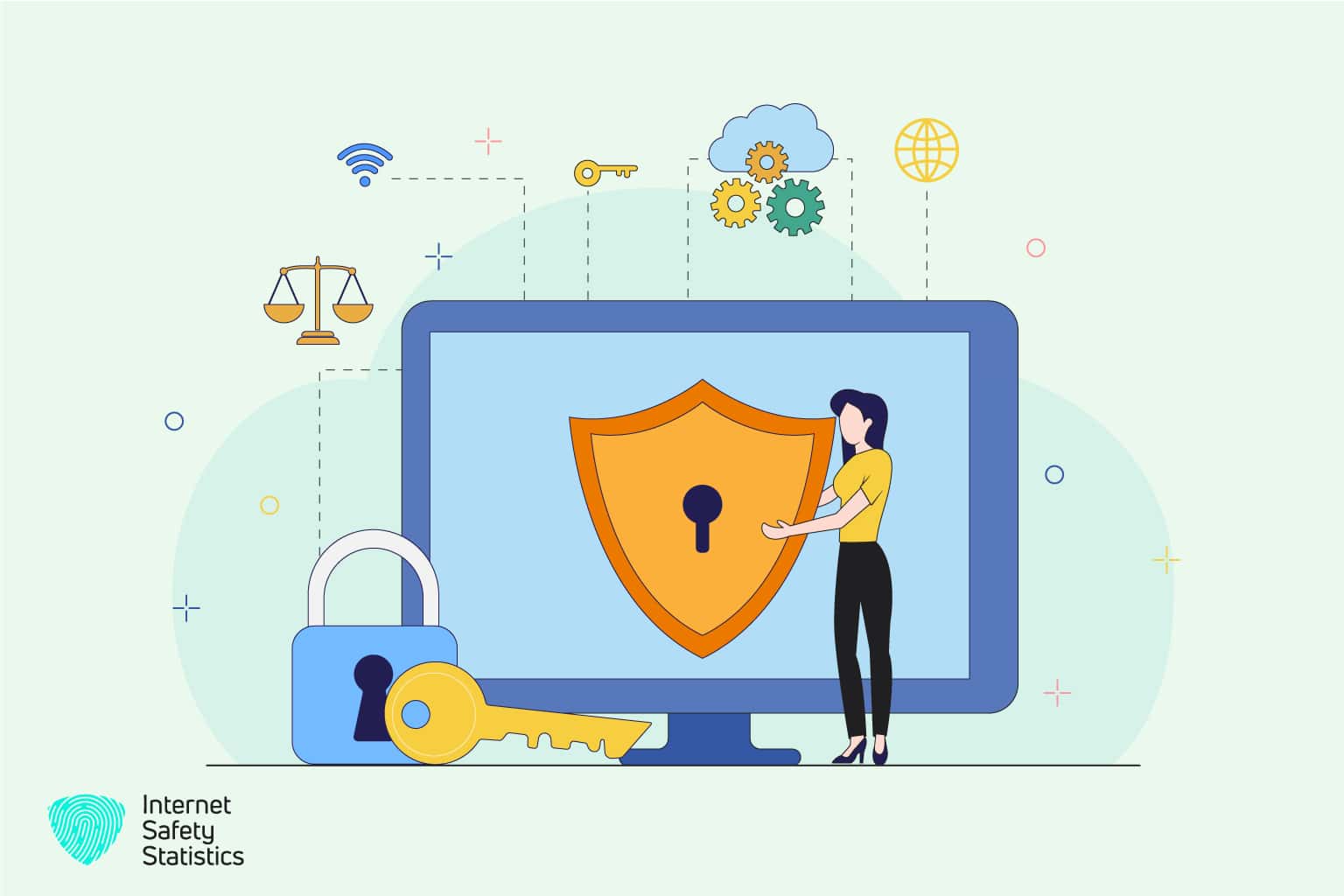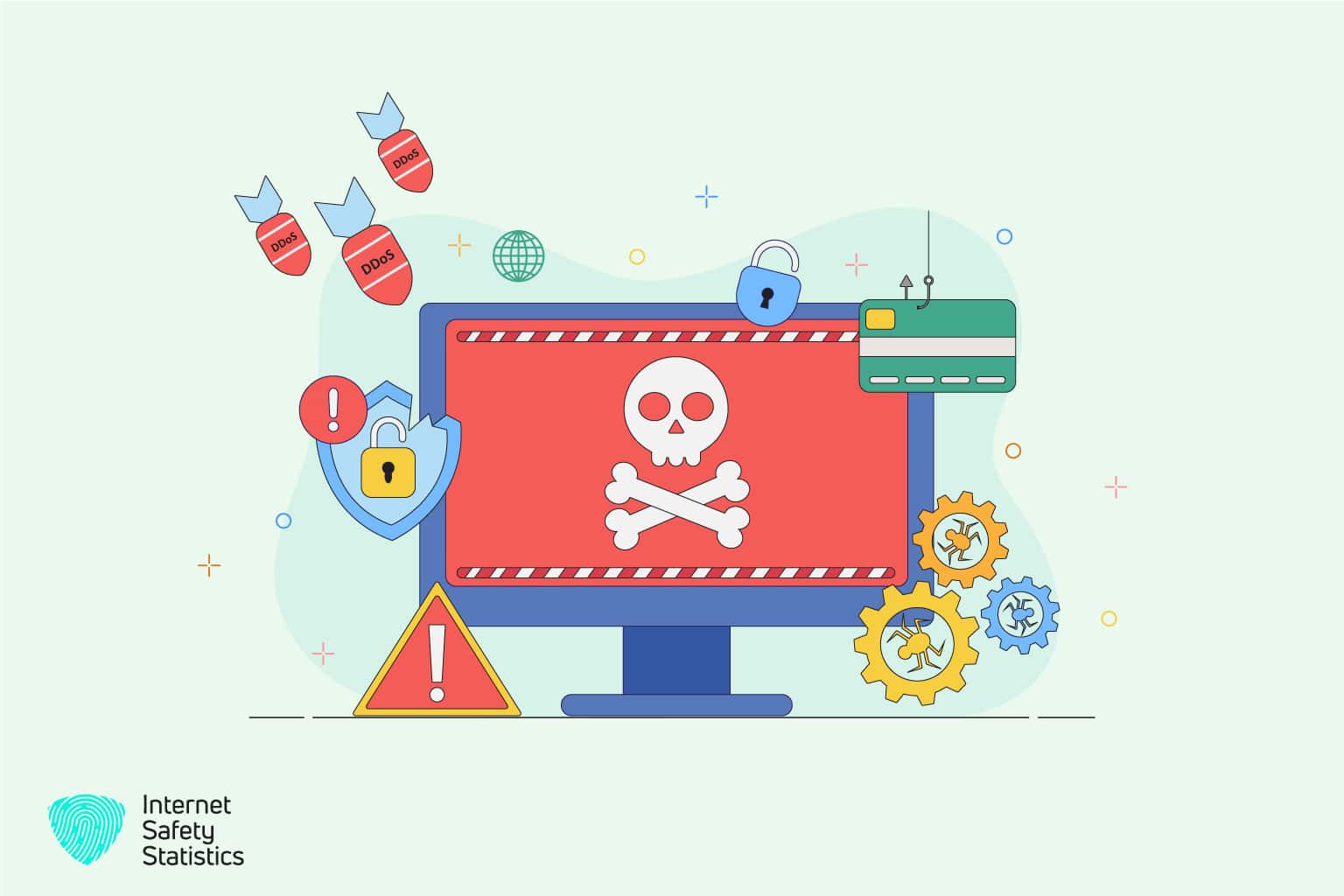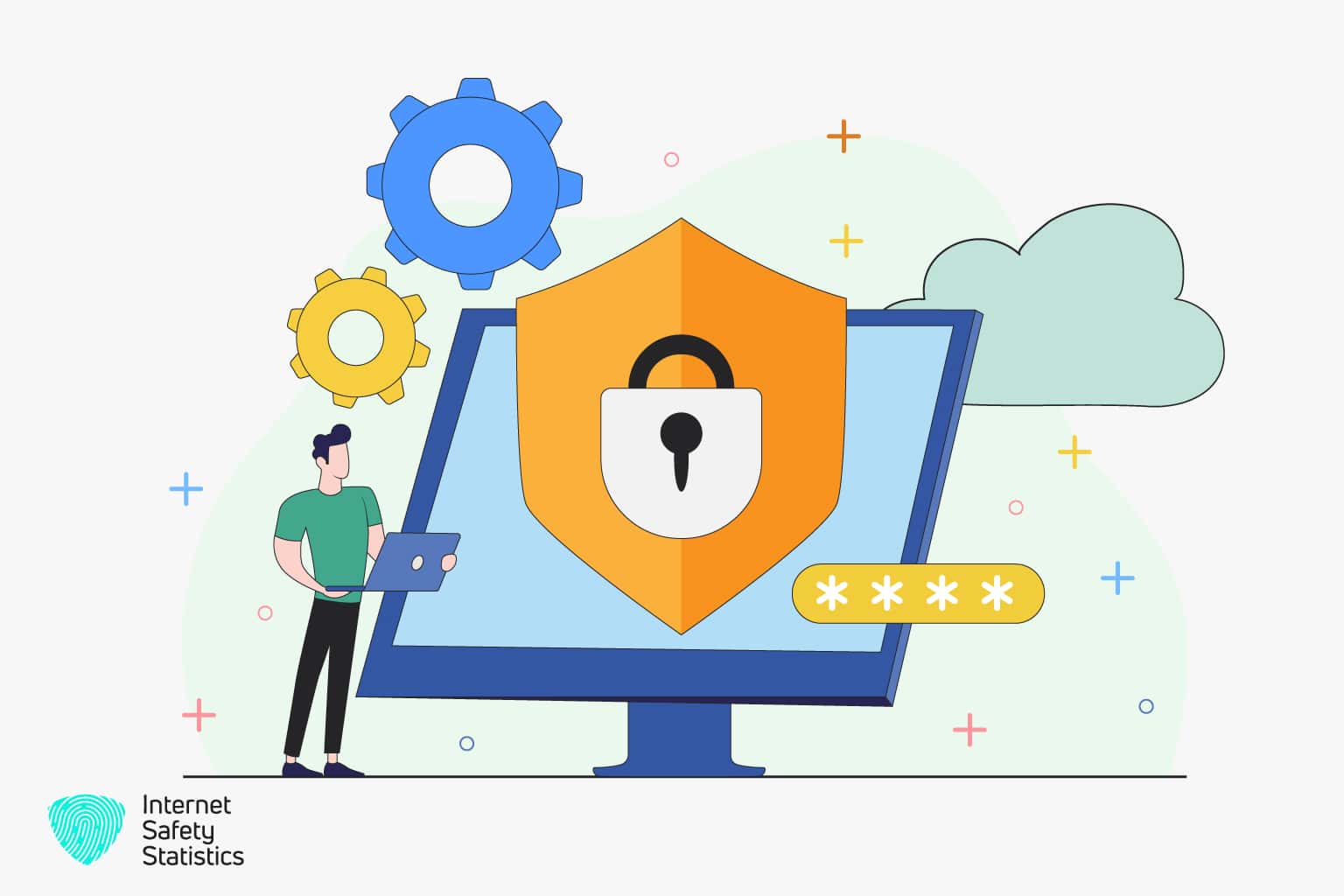
As technology continues to advance, we continue to see new methods for criminals to take advantage of those who are weak and/or unaware of how things work online. Not having the proper knowledge about cyber law, internet safety, and methods to protect personal information can often lead to someone easily falling victim to online fraud, scams, and identity theft.
Cyber laws have been established to help protect victims. They also help make it possible to prosecute these criminals to the fullest extent of the law. Without cyber laws, criminals will continue to target and attack their victims.
What is Cyber Law?
Lawmakers work hard to keep up with the continual change and growth in technology. Sometimes, when certain cybercrimes are committed, there are no laws specifically targeting said crimes. In other cases, cybercrimes are prosecuted under other laws protecting citizens from falling victim to fraud, scams, identity theft and other technology-based crimes.
According to the Digital Business Law Group, cyber law is any law focusing on “the Internet, computer law, e-commerce law, and any number of variations.” All in all, cyber law is an assortment of legal doctrines that govern the use of these variations of technologies. Most of these doctrines predate the Internet but have been used in conjunction with laws that have been passed as a result of the continual change in technological advances.
Cybercrimes

Cybercrimes represent a pervasive and evolving threat in the digital age, encompassing a broad spectrum of illicit activities perpetrated through electronic means. From hacking and identity theft to online fraud and phishing scams, cybercriminals employ sophisticated techniques to exploit vulnerabilities in digital systems and compromise the security and privacy of individuals, businesses, and governments alike. These crimes not only result in significant financial losses but also inflict lasting damage to victims’ reputations and undermine trust in digital technologies. Moreover, the borderless nature of the internet complicates law enforcement efforts, as cybercriminals can operate from remote locations with relative anonymity, making it challenging to apprehend and prosecute offenders.
The proliferation of interconnected devices and the increasing reliance on digital infrastructure have expanded the attack surface for cybercriminals, posing unprecedented challenges to cybersecurity professionals and policymakers. The emergence of new technologies, such as artificial intelligence and the Internet of Things, introduces novel risks and vulnerabilities that cybercriminals exploit to orchestrate sophisticated attacks. Additionally, the rapid digital transformation driven by the COVID-19 pandemic has accelerated the adoption of remote work and online services, further amplifying the threat landscape.
To mitigate the risk of cybercrimes, stakeholders must prioritise cybersecurity education and awareness, implement robust security measures, and foster international collaboration to combat cyber threats effectively. By promoting a culture of cyber resilience and investing in cutting-edge cybersecurity solutions, societies can fortify their defences against evolving cyber threats and safeguard the integrity of the digital ecosystem.
Here is a list of the kinds of documented cybercrimes:
- Computer crimes
- Cyberbullying
- Sexting
- Identity theft
- Online scams
- Phishing scams
- Selling fakes online
- Spoofing
- Blackmail
- Unauthorised accessing of stored communications
- Extortion
- Sports betting
- Non-delivery of merchandise purchased over the Internet
- Electronic harassment
- Child pornography
- Prostitution
- Drug trafficking
- Telemarking fraud
- Health care fraud
- Pyramid schemes
The above-listed crimes are just a sampling of the cyber crimes that have been documented. Many cyber criminals focus on conning the weak. This includes those who are not strong Internet users, including children and the elderly. Many of the Nigerian scams focus on illegally retrieving passwords and account numbers from the elderly and leaving their bank accounts empty.
Cyber Laws
There are many different variations of cyber law, most covering fraud, security, identity protection, and property protection. Areas of cybercrime laws include:
- Contracts: These generally occur when a user downloads or installs software onto their computer or signs up for a membership on various websites.
- Copyright: These laws limit what can be reproduced, distributed, and copied. All rights belong to the creator unless permission has been granted to another party to reproduce, copy, or distribute said pieces of work. This includes artwork, writing, sound recordings, videos, and photographs.
- Defamation: Under common law, proof must be presented to win a case of defamation, including the defamatory statement, true identification of the defendant, publication of the statement, and proof of damages.
- Domain disputes: These occur when there is a disagreement as to who has the right to own certain domains and can sometimes fall under trademark infractions.
- Employment: There are many people who are employed through online services and are protected under most general employment laws. These laws also protect employers through non-compete contracts and other contracts signed by employees to protect the company.
- Patents: This is a set of exclusive rights granted for a specific period of time to the inventor of a product or concept. This type of law is considered a speciality and there are attorneys that specifically work helping those seeking patents or needing assistance when their patent rights have been violated.
- Privacy: This includes business systems getting hacked, hospital records being illegally accessed, and personal computers being hacked for personal information, such as bank accounts, passwords, user IDs and other personal details about the victim.
- Trademarks: Trademarks are things that serve to identify a specific product, company, or service. These items include colours, brands, images, phrases, words, logos, company names, or any combination. These items are registered as trademarks and are protected from being used to represent another company, product or service without the permission of the trademark owner.
Cyberbullying
Cyberbullying is the act of using electronic means of communication to bully someone. The most common methods of cyberbullying include sending intimidating messages as a way of making the victim do something out of fear. According to Stop Bullying, these crimes occur when the perpetrator uses various electronic technology, including smartphones, computers, and tablets.
Different examples of cyberbullying include intimidating text messages or emails and sending rumours or false statements about the victim via email or by posting these statements on social media sites or blogs. Another example includes posting or sending embarrassing pictures, videos, or fake profiles meant to cause harm to the victim’s social reputation.
Those who have fallen victim to a cyberbully are more likely to:
- Abuse of alcohol and drugs
- Skip school and/or work
- Fall victim to in-person bullying from the same or different bully
- See a drop in school and/or work performance
- Have low self-esteem
- Suffer from stress-related health problems
- Become socially withdrawn
- Have emotional outbursts
- Have a sudden fear of using technology
- Turns the phone off so there is no way for the bully to make contact
Laws on Cyberbullying
Just like with any other area of cyber law, lawmakers are working hard to keep up with technology by creating and passing laws to protect those who have fallen victim to a cyberbully. Currently, there is no federal law that specifically applies to bullying, on or off the computer. Because of this, cyberbullying is handled at the state level, with each state addressing this serious crime in a different manner.
Some states have laws against cyberbullying, and others have not passed any specific laws for this crime. In fact, in some cases, cyberbullying is prosecuted through other laws. So, justice is still being served, just not through any specific cyber law. In fact, most cyberbullying cases are prosecuted under state and federal harassment laws.
Cyber Security Laws

Cyber security regulations safeguard all variations of information technology and computer systems. Task forces have been created to monitor and investigate cyber-attacks such as viruses, worms, phishing, unauthorised access, Trojan horses, and control system attacks.
Because threats of these attacks exist, it is important for those who use the internet to take all necessary precautions to protect their data and the security of their computer. Different measures put in place to protect users online include firewalls, encryption, log-in passwords, anti-virus software and intrusion detection systems.
General Cybersecurity & Data Security
- Federal Trade Commission Act (FTC Act): Section 5 empowers the FTC to regulate “unfair and deceptive acts or practices”, which includes data security failures. Organisations must implement “reasonable” safeguards based on the sensitivity of the data they handle.
- Gramm-Leach-Bliley Act (GLBA): Applies to financial institutions and mandates specific data security measures to protect the customer’s financial information.
- Federal Information Security Management Act (FISMA): Governs cybersecurity within federal agencies and sets standards for protecting government information systems.
- Cybersecurity and Infrastructure Security Agency (CISA): Leads national efforts in cybersecurity and provides resources and guidance to various sectors.
- Cyber Incident Reporting for Critical Infrastructure Act (CIRCIA): Requires critical infrastructure facilities to report significant cyber incidents and ransomware payments to CISA.
Sector-Specific Regulations
- Health Insurance Portability and Accountability Act (HIPAA): Protects the privacy and security of healthcare data.
- Sarbanes-Oxley Act (SOX): Requires public companies to maintain adequate internal controls over financial reporting, including cybersecurity measures.
- Federal Energy Regulatory Commission (FERC) Critical Infrastructure Protection (CIP) Standards: Protect the bulk electric system from cyber threats.
- Securities and Exchange Commission (SEC) Regulation S-P: Requires publicly traded companies to disclose material cybersecurity risks and incidents.
Additional Points
- Cybercrime Laws: The Computer Fraud and Abuse Act (CFAA) criminalises unauthorised access to computer systems and data theft.
- State Laws: Many states have enacted their own cybersecurity laws, often focusing on data breach notification requirements.
- Evolving Landscape: The federal cybersecurity regulatory landscape is constantly evolving, with new proposals and legislation under consideration.
In addition to these federal laws, many states have passed laws at the state level to help enhance cybersecurity measures and Internet users. For example, in 2003, California passed the Notice of Security Breach Act, which requires companies to disclose details of any breaches in the security of systems containing personal information about citizens of California.
What to Do If You Have Fallen Victim to a Cybercrime
If you’ve fallen victim to a cybercrime, taking immediate action is crucial to mitigate potential damages and protect your personal information. Here are essential steps to follow if you find yourself in this unfortunate situation:
- Document the Incident: Take detailed notes of the cybercrime incident, including the date, time, and nature of the attack. Preserve any relevant evidence, such as suspicious emails, messages, or unauthorised transactions, as this information may be valuable for law enforcement and cybersecurity professionals.
- Report the Incident: Contact your local law enforcement agency or cybercrime reporting centre to file a formal report. Provide authorities with as much information as possible, including the nature of the cybercrime, any financial losses incurred, and relevant digital evidence. Reporting the incident promptly increases the likelihood of apprehending the perpetrators and preventing future attacks.
- Notify Financial Institutions: If the cybercrime involves unauthorised access to your financial accounts or fraudulent transactions, notify your bank, credit card companies, or other financial institutions immediately. Request to freeze or close compromised accounts to prevent further unauthorised activity and dispute any fraudulent charges to minimise financial losses.
- Change Passwords and Secure Accounts: As a precautionary measure, change the passwords for all your online accounts, especially those directly affected by cybercrime. Use strong, unique passwords and enable multi-factor authentication wherever possible to enhance account security and prevent unauthorised access.
- Update Security Software: Ensure that your computer and other digital devices have up-to-date security software installed to detect and remove malware or malicious programs. Regularly update operating systems, antivirus software, and security patches to address known vulnerabilities and protect against emerging threats.
- Monitor Financial Activity: Monitor your bank statements, credit reports, and online accounts regularly for any suspicious or unauthorised activity. Set up alerts and notifications to receive real-time updates on account transactions and take immediate action if you detect any unusual or fraudulent behaviour.
- Educate Yourself and Stay Informed: Stay informed about common cyber threats, scams, and phishing techniques to recognise and avoid potential risks in the future. Educate yourself on cybersecurity best practices, such as safe browsing habits, secure password management, and data protection measures, to mitigate the likelihood of falling victim to cybercrimes.
By following these proactive steps and collaborating with law enforcement and cybersecurity professionals, individuals can effectively respond to cybercrime incidents, safeguard their personal information, and mitigate potential damages in the digital age.
